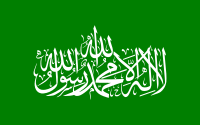Loading AI tools
Syrian Palestinian rebel group From Wikipedia, the free encyclopedia
Aknaf Bait al-Maqdis (Arabic: أكناف بيت المقدس, romanized: ʾAknāf Bayt al-Maqdis, lit. "Region of the Holy House") was a Syrian Palestinian rebel group active during the Syrian Civil War.
| Aknaf Bait al-Maqdis | |
|---|---|
| أكناف بيت المقدس | |
 | |
| Leaders | |
| Dates of operation | c. 2012/13 – 2015 (main group) 2015 – present (remnant faction) |
| Allegiance | |
| Headquarters | Yarmouk Camp, Damascus |
| Active regions | Southern Syria |
| Ideology | Sunni Islamism |
| Size | 200 (2015)[6] |
| Allies | Al-Rahman Legion[8] |
| Opponents |
|
| Battles and wars | Syrian Civil War |
| Website | aknafpal.com[1] |
Following the outbreak of the Syrian Civil War, several Palestinian and Syrian members of Hamas joined the rebellion against the Syrian government, and formed Aknaf Beit al-Maqdis.[14] The group was only loosely affiliated to the Syrian opposition,[15] however, and its true allegiance remained with Hamas.[16][17] Hamas, however, officially denied any links with Aknaf Beit al-Maqdis.[18] The group was primarily active in the Yarmouk Camp of Damascus, which it defended alongside other insurgents from government attacks from 2013.[4] It also had branches in Quneitra[19] and the Daraa Governorate in southern Syria. Aknaf Beit al-Maqdis' faction in Daraa took part in a rebel offensive in September 2013 which aimed at capturing the Daraa border crossing.[20]
Aknaf Beit al-Maqdis battled the Islamic State of Iraq and the Levant, backed by al-Nusra Front, in April 2015 and lost 90% of its territory in Yarmouk Camp.[16][17][21] As result, Aknaf Beit al-Maqdis disintegrated, as the group was officially absorbed into the Syrian government forces, while many of its members defected to the Al-Nusra Front and ISIL.[22] In order to save the remainder of the group (by then reduced to 160 fighters), Hamas leader Khaled Mashal reportedly contacted leading members of the PFLP-GC, Hezbollah, and the Amal Movement to guarantee the safety of Aknaf Beit al-Maqdis' members. The group's Yarmouk branch consequently joined the Syrian government forces,[23] and one of its commanders declared the entire group dissolved.[4] Local pro-government troops continued to regard the reconciled ex-Aknaf Beit al-Maqdis fighters with suspicion.[23] In early 2015, amidst its political disintegration, the UN secretary-general Ban Ki-moon accused the group of being implicated in rape and other forms of conflict-related sexual violence.[24]
Despite the events of April 2015, a faction of the group remained active in Yarmouk Camp and allied with the Syrian rebels. This faction rejected offers of reconciliation by the government in January 2017,[25] though it, along with Jaysh al-Islam and Jaysh al-Ababil, signed a ceasefire agreement with government forces in October 2017.[26]
After most rebel factions in southern Damascus, including Aknaf Beit al-Maqdis, initially rejected offers to be transported to insurgent-held areas in northern Syria,[27] the government launched an offensive from April 2018, aiming to retake all of southern Damascus. Amid this offensive, Aknaf Beit al-Maqdis clashed with the more numerous Palestinian pro-government militias in Yarmouk Camp.[14] Hard-pressed and without hopes of victory, the insurgents yielded in May, and agree to surrender and be relocate to northern Syria. The pro-rebel Aknaf Beit al-Maqdis militants and their families were among the first group of surrendered insurgents to be transported to the north.[28]
Seamless Wikipedia browsing. On steroids.
Every time you click a link to Wikipedia, Wiktionary or Wikiquote in your browser's search results, it will show the modern Wikiwand interface.
Wikiwand extension is a five stars, simple, with minimum permission required to keep your browsing private, safe and transparent.